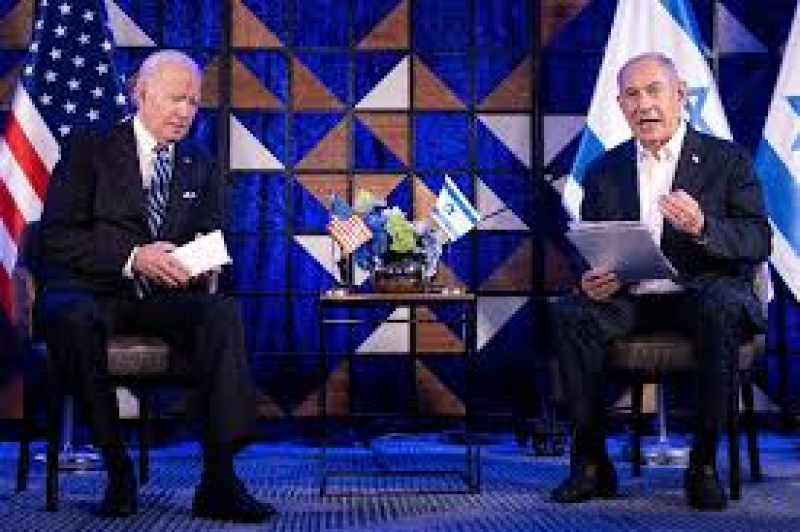- Gaza Ceasefire Not Enough as Children Continue to Die |
- Bangladesh Sets Guinness Record With 54 Flags Aloft |
- Gambia Tells UN Court Myanmar Turned Rohingya Lives Hell |
- U.S. Embassy Dhaka Welcomes Ambassador-Designate Brent T. Christensen |
- Survey Shows Tight Race Between BNP and Jamaat-e-Islami |
Biden says Palestinian state still possible after Netanyahu call

(BSS/AFP) - US President Joe Biden said Friday it was still possible Israeli Prime Minister Benjamin Netanyahu could agree to some form of Palestinian state, after the two leaders spoke for the first time in nearly a month amid tensions over the Gaza war.
Their call came a day after Netanyahu said he opposes allowing Palestinian sovereignty in the wake of the conflict with Hamas, deepening Israeli divisions with key backer Washington over the conduct of Israel's offensive and what comes next.
But Biden said after the call that it was not impossible Netanyahu might come round to some form of so-called two-state solution, mooted for decades as a way to end tensions in the Middle East, despite the Israeli premier's comments.
"There are a number of types of two-state solutions. There's a number of countries that are members of the UN that... don't have their own militaries," Biden told reporters after an event at the White House.
"And so, I think there's ways in which this could work."
Asked what Netanyahu was open to, Biden replied: "I'll let you know."
Biden and Netanyahu, who have a complicated relationship stretching back some 40 years, last spoke on December 23 and the silence between them since has led to repeated questions about a rift.
Netanyahu has pledged to destroy Hamas and demilitarize Gaza following the October 7 attacks on Israel, and is increasingly resistant to US pressure for a plan that includes any form of Palestinian statehood that could threaten his country.
The Israeli premier said on Thursday that his country "must have security control over all the territory west of the Jordan (River)" and that he had made this clear to Israel's "American friends".
"This is a necessary condition, and it conflicts with the idea of (Palestinian) sovereignty," Netanyahu said in public remarks.
- 'Promise and possibility' -
The White House said earlier that Biden had pushed the issue with Netanyahu when they spoke, but said the call had not been in direct response to the Israeli's comments.
"The president still believes in the promise and the possibility of a two-state solution" for both Israelis and Palestinians, US National Security Council spokesman John Kirby told reporters.
The call also discussed US hostages still among those held captive by Hamas since the October 7 attack on Israel, he added.
Biden and Netanyahu have often been at loggerheads in the past, with the Democratic US president last year pressing the right-wing Israeli premier over controversial judicial reforms.
But Biden has stood firmly behind Israel since October 7, even travelling to the country after the attacks, where he publicly embraced Netanyahu and pledged full US support.
Fresh tensions have emerged since then however as the toll of the Israeli offensive on Gaza has mounted, with Biden warning that Israel could lose support by "indiscriminate bombing" and pushing for a two-state solution.
US Secretary of State Antony Blinken told the World Economic Forum in Davos, Switzerland this week said Israel would not get "genuine security" without a "pathway to a Palestinian state."
The October 7 attacks resulted in the deaths of about 1,140 people in Israel, most of them civilians, according to an AFP tally based on Israeli figures. Hamas also seized about 250 hostages, around 132 of whom Israel says remain in Gaza.
Israel's relentless air and ground offensive has killed at least 24,762 Palestinians, around 70 percent of them women, young children and adolescents, according to Gaza's health ministry.

